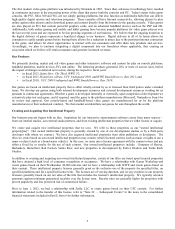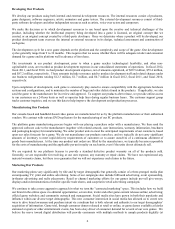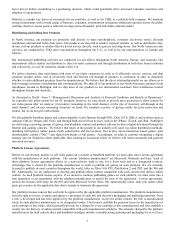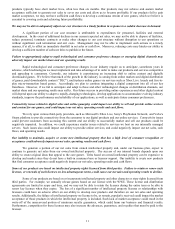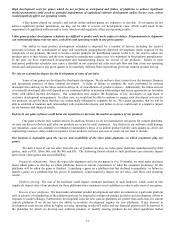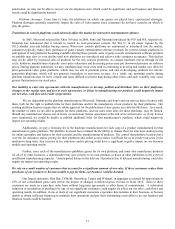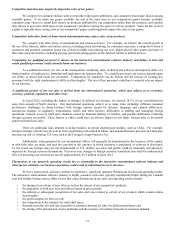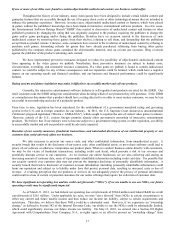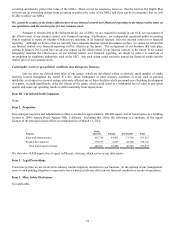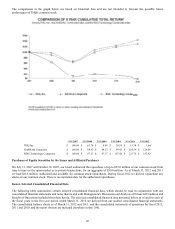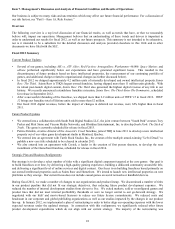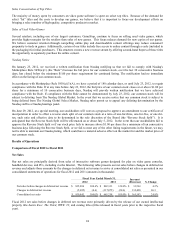THQ 2012 Annual Report Download - page 23
Download and view the complete annual report
Please find page 23 of the 2012 THQ annual report below. You can navigate through the pages in the report by either clicking on the pages listed below, or by using the keyword search tool below to find specific information within the annual report.15
Competitive launches may negatively impact the sales of our games.
We compete for consumer dollars with several other video game publishers, and consumers must make choices among
available games. If we make our games available for sale at the same time as our competitors' games become available,
consumers may choose to spend their money on products published by our competitors rather than our products, and retailers
may choose to give more shelf space to our competitors' products, leaving less space to sell our products. Since the life cycle of
a game is typically short, strong sales of our competitors' games could negatively impact the sales of our games.
Competition with other forms of home-based entertainment may reduce sales of our products.
We compete with other forms of entertainment and leisure activities. For example, we believe the overall growth in
the use of the Internet, tablets and online services, including social networking, by consumers may pose a competitive threat if
customers and potential customers spend less of their available time playing our core, higher-priced video games and more of
their time using the Internet, including playing social networking games on the Internet, tablets or mobile devices..
Competition for qualified personnel is intense in the interactive entertainment software industry and failure to hire and
retain qualified personnel could seriously harm our business.
To a substantial extent, we rely on the management, marketing, sales, technical and software development skills of a
limited number of employees to formulate and implement our business plan. To a significant extent, our success depends upon
our ability to attract and retain key personnel. Competition for employees can be intense and the process of locating key
personnel with the right combination of skills is often lengthy. The loss of key personnel could have a material adverse impact
on our business.
A significant portion of our net sales is derived from our international operations, which may subject us to economic,
currency, political, regulatory and other risks.
In fiscal 2012, excluding the impact of changes in deferred net revenue, we derived 38.3% of our consolidated net
sales from outside of North America. Our international operations subject us to many risks, including: different consumer
preferences; challenges in doing business with foreign entities caused by distance, language and cultural differences;
unexpected changes in regulatory requirements, tariffs and other barriers; difficulties in staffing and managing foreign
operations; reduced access to retail sales channels caused by financial stability of retailers; and possible difficulties collecting
foreign accounts receivable. These factors or others could have an adverse impact on our future foreign sales or the profits
generated from those sales.
There are additional risks inherent in doing business in certain international markets, such as China. For example,
foreign exchange controls may prevent us from expatriating cash earned in China, and standard business practices in China may
increase our risk of violating U.S. laws such as the Foreign Corrupt Practices Act.
Additionally, sales generated by our international offices will generally be denominated in the currency of the country
in which the sales are made, and may not correlate to the currency in which inventory is purchased, or software is developed.
To the extent our foreign sales are not denominated in U.S. dollars, our sales and profits could be materially and adversely
impacted by foreign currency fluctuations. Year-over-year changes in foreign currency translation rates had the mathematical
effect of increasing our reported net loss by approximately $1.9 million in fiscal 2012.
Fluctuations in our quarterly operating results due to seasonality in the interactive entertainment software industry and
other factors related to our business operations could result in substantial losses to investors.
We have experienced, and may continue to experience, significant quarterly fluctuations in sales and operating results.
The interactive entertainment software industry is highly seasonal, with sales typically significantly higher during the calendar
year-end holiday buying season. Other factors that cause fluctuations in our sales and operating results include:
• the timing of our release of new titles as well as the release of our competitors' products;
• the popularity of both new titles and titles released in prior periods;
• the deferral or subsequent recognition of net sales and costs related to certain of our products which contain online
functionality;
• the profit margins for titles we sell;
• the competition in the industry for retail shelf space;
• fluctuations in the size and rate of growth of consumer demand for titles for different platforms; and
• the timing of the introduction of new platforms and the accuracy of retailers' forecasts of consumer demand.


